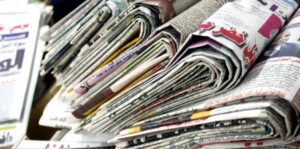Media revamp committee to be formed in Sudan
Sudan’s Minister of Information, Culture, and Tourism, Feisal Mohamed Saleh, ordered the formation of an advisory committee for media reform on Friday, headed by the dean of the Sudanese press, Mahjoub Mohamed Saleh, and 17 others.
 Newspaper kiosk in Khartoum (SUNA)
Newspaper kiosk in Khartoum (SUNA)
Sudan’s Minister of Information, Culture, and Tourism, Feisal Mohamed Saleh, ordered the formation of an advisory committee for media reform on Friday, headed by the dean of the Sudanese press, Mahjoub Mohamed Saleh, and 17 others.
The function of the committee will be to study and draw up media policies that determine the general direction of the country’s media system according to the principles and objectives of the December Revolution and the Constitutional Document.
In addition, media laws and laws related to media will be reviewed in order to be compliant with international laws and values concerning human rights and freedom of expression.
The legislation includes the Press and Publications Law, the Public Authority for Radio and Television Law, the Right to Information Law, the Radio Broadcasting Law, as well as the Information and Cybercrime Law.
The committee will also review the status of public and private media institutions "so that they serve the Sudanese people's right to knowledge, and to receiving and circulating news and information."
In November last year, the Ministry of Culture and Information said Sudan’s media laws would be amended within six months. However, in January, the minister said that the transformation of Sudan’s media to a democratic system is a long journey.
“We are aiming to transform the government media to a public service model, simply because we are entering a multi-party electoral system and we do not want one part to control the media. It will be independent from government control, serving the country, serving the people, the society in general, without being in the hand of the government… any government,” he said.
The reform of the media is part of a comprehensive national reform process in Sudan. The establishment of an independent commission on media reform was one of the recommendations issued by UNESCO as part of the joint programme with the Ministry of Information, Culture and Tourism.
Radio Dabanga’s editorial independence means that we can continue to provide factual updates about political developments to Sudanese and international actors, educate people about how to avoid outbreaks of infectious diseases, and provide a window to the world for those in all corners of Sudan. Support Radio Dabanga for as little as €2.50, the equivalent of a cup of coffee.












 and then
and then